- Home
- J. T. Edson
The Floating Outfit 13 Page 4
The Floating Outfit 13 Read online
Page 4
‘The small yellow man can—if he has the medicine man’s puha,’ replied the Kid, ‘We will show you.’
Knowing what would be needed, Mark picked up two wooden blocks and set them about eighteen inches apart on the table-top. Hollenheimer made impressive passes with his hands around Tommy and chanted a string of Latin words, giving the Waw’ai the idea that he conferred puha upon the small Oriental. Meanwhile Dusty laid the broom handle across the blocks and gripped one end of it, Mark taking hold of the other end so as to hold it firmly in place.
With the scene set, Tommy walked towards the table. To obtain the necessary concentration of strength at the point of impact, Tommy needed to co-ordinate his breathing, timing and speed with the power of his entire body. Standing relaxed, toes gripping the floor—he had removed his sandals on hearing what Dusty wanted, Tommy inhaled deeply through his nose and his eyes fixed on the broom handle with calculating intensity. Then he tensed, going into the fudolachi fighting stance, legs apart and bent, right arm extended with the hand held in the tegatana, hand-sword, position. Up whipped the right arm and drove down again, moving almost too fast for the eye to follow.
‘Kiai!’ Tommy shouted as the heel of his hand crashed on to the centre of that part of the broom handle between the two blocks.
Dusty and Mark felt the sudden jolt, then the wood cracked, splintered and broke. A startled exclamation burst from Hollenheimer, having never seen the deadly tameshiwari method of breaking wood with the bare hands. Luckily the Waw’ai was too amazed to notice that the white ‘medicine man’ seemed remarkably surprised at the effect of his own puha.
Without giving any sign of noticing the effect his demonstration had on the Indian, Tommy turned and walked across the room. Again he paused to gather his full power, then gave the traditional spiritual cry of ‘Kiai!’ and delivered a yoko kekonii side-thrusting kick which drove his foot through the planks of the wall. The move happened so swiftly that the Waw’ai could hardly believe his eyes and Hollenheimer’s mouth dropped open as he stared at the jagged hole in what had been solid timber.
‘Now do you believe me?’ asked the Kid of the staring Waw’ai.
Dragging his eyes from the shattered plank, the Indian nodded. ‘I believe. No Nemenuh medicine man could give such puha.’
‘The white witch man can save you from any death-curse,’ the Kid pointed out, ‘So if you tell us what we want to know, you can go free and no harm will come to you for doing it.’
Only for a moment did the Waw’ai hesitate. Any nation which could produce the marvels which the white men possessed, like repeating rifles, revolvers, steel knives and arrow heads, must have medicine men of great power. From what he had just witnessed, those same medicine men were capable of producing miraculous results on human beings. More than one Comanche medicine man claimed to have a power to protect a brave from injury, but all failed when put to the acid test. Yet the white man’s puha worked. That broken broom handle and shattered wall gave proof of its effectiveness.
Although superstitious, the Waw’ai was no fool. He knew that a refusal to answer would mean a long, painful session of torture to make him tell and most likely death at the end no matter what happened. Only fear of the Death Bringer’s curse held him from co-operating and now he could see a way to avoid it.
‘If I speak, the white medicine man will give me his puha and I can go free?’ he asked.
‘I have said it,’ the Kid replied.
‘You say it on the sun-curse?’ demanded the Waw’ai.
‘If you tell us all we ask, you can go free,’ the Kid promised and drew himself up erect. ‘Sun, father, you heard me say it. Earth, mother, you heard me say it. Do not let me live another season if I speak with a forked tongue.’
Satisfaction showed on the Waw’ai’s face as the Kid spoke the words of the sun-curse. No Nemenuh of Cuchilo’s birth and upbringing would repeat the sacred oath unless he meant it.
‘The Death Bringer sent us to kill you, Cuchilo. Also the old one called Diablo Viejo.’
‘That’s Ole Devil,’ the Kid told his white audience; mainly for Hollenheimer’s benefit. He turned back to the Waw’ai. ‘Why were you to kill us?’
‘I do not know,’ the man admitted. ‘When the Death Bringer orders, only a fool, and one soon to be dead, refuses to obey.’
‘Who is the Death Bringer?’ Hollenheimer put in.
And nearly spoiled everything. The Waw’ai showed his surprise that such a great medicine man would be so ignorant.
‘She is the mother of Sidewinder and a great witch woman,’ he said.
‘Is she a Waw’ai?’ the Kid asked, hoping that Hollenheimer would have enough sense to keep quiet.
‘Yes,’ the Indian replied.
‘Was she born into the Waw’ai?’
‘No. She and her son came to us many seasons ago. At first we thought to kill them both, for she was Mexican and her son lame from a knife wound so badly none expected him to walk again,’
‘Great day in the morning!’ the Kid breathed, all ordinary oaths being inadequate for his feelings at the news.
‘The wound healed and the woman became a great witch. Her son rose to be a war-bonnet chief, a mighty raider and taker of many scalps,’ the Waw’ai went on, not understanding the Kid’s exclamation or interest. ‘She says we must not make peace with the white man, that the council they call is a trick.’
‘What’s up, Lon?’ Mark asked, seeing the strained expression on the Kid’s face.
‘When I told you I didn’t know Sidewinder,’ the Kid replied in hardly more than a whisper, ‘I was wrong. I know him real good.’
‘Who is he?’ asked Dusty. ‘And who’s the Death Bringer?’
‘She’s a Mexican prisoner who was adopted into the Pehnane. They called her Fire Dancer, and she had a son. He got the name No Father on account of pappy killing his old man the day I was born.’
‘So you know Sidewinder then,’ Hollenheimer said.
‘I know him all right,’ agreed the Kid. ‘It was my knife that crippled him and the next time we meet, one of us is going to die.’
Chapter Four – The Death Bringer’s Orders
While Dusty and the others might have liked to hear more about the Kid’s reason for intending to kill No Father, or Sidewinder as he was now known, they knew they could waste no time asking about it. By showing ignorance of the Death Bringer’s identity, Hollenheimer could have weakened the Waw’ai’s faith in his spiritual powers. At any moment the Indian might realize that he had been tricked and stop demonstrations of Tommy’s twneshiwari powers, displays of other scientific wonders, nor the most painful physical tortures—would elicit further details from the Waw’ai.
‘Ask him what other men were sent out,’ Dusty told the Kid, with a sinking feeling that he already knew the answer and could even guess at the identity of the proposed victims. So far doubt had not crept too deeply into the Waw’ai’s head. He glanced at the hole in the wall, then towards the microscope and concluded that the white medicine man might be jealous of the Death Bringer’s powers and so pretended not to know her.
‘We were only one of the parties she sent out,’ he replied when the Kid passed on Dusty’s questions ‘Other brave-hearts also went to kill.’
Seeing Hollenheimer open his mouth to ask a question, Dusty swung around to put his back to the Waw’ai and face the savant.
‘So help me, Professor,’ he hissed. ‘If you ask another fool question, I’ll see if I can bring off one of Tommy’s stunts on you.’
While a man of some considerable importance and used to respect, Hollenheimer did not regard himself as a demi-god or expect everybody to worship at his feet. He realized that only a colossal blunder on his part would cause Dusty to address him in such a manner and a moment’s thought told him where he went wrong. So he held back from repeating the mistake and allowed the Kid to continue with the questioning.
‘All right,’ said the Kid, ignoring the interruption. ‘Who are those
to die?’
Even as the Kid asked the question, a. man walked towards his death.
The Reverend Miles Boardwell strolled through the darkness towards his home on the outskirts of Mound Prairie, Anderson County. A tall, stalwart man of commanding appearance, the Reverend was a popular figure in his home town and the surrounding district; liked and respected despite his expressed views on the subject of fair play and decent treatment for the Indians. Any parson who made his sermons short but interesting, regarded moderate drinking and gambling as acceptable human weaknesses, and could forget his cloth during the week to the extent of going hunting or fishing with his parishioners, must be excused his one minor idiosyncrasy—especially in an area long removed from Indian depredations, So, although a few of the staider souls whispered that he should not associate himself with such a controversial issue, nobody raised any objections to his decision to attend the Fort Sorrel peace meeting.
Much as he hated to leave a promising coon hunt before the hounds sang to the skies that they had run old ringtail up a tree, the Reverend Boardwell did so. In the morning he would be leaving for Fort Sorrel and wished to catch some sleep before doing so.
He saw the two shapes rise from the gate in his home’s picket fence, but failed to take alarm. Too late he realized that they were not a couple of his hunting companions returned with news of a success on another part of Hurricane Creek.
‘Are you white-eye god-man who come to Comanches?’ asked the man at the left.
‘I am,’ Boardwell agreed. ‘Who are—’
Raw and rank to his nostrils came the smell of rancid antelope grease as the men sprang towards him and he saw steel glinting in their hands. Although he carried a shotgun under his arm, Boardwell never thought to use it; could not in fact, as he had removed the shells on approaching the edge of town. He let the gun fall and launched a punch, feeling his knuckles smash the nose of the man on his right. Bringing his knife across in the sideways stroke, which formed the second blow in the Indian method, the other man sank it deep into Boardwell’s side and ripped savagely. Almost the last sound the preacher heard as pain knifed through him was the deep-throated Comanche coup claim.
‘A’he!’ grunted the attacker. ‘I claim it!’
Ignoring the blood which spurted from his nose, the first man drove down his knife in a savage chop which sank it deep into the reeling preacher’s back. Boardwell crumpled forward and collapsed to the ground. With a snarl of rage the injured first attacker dropped to his knees alongside the feebly moving, dying man, tore off and hurled aside the low crowned black hat, then put his knife to work once again. His companion, more practical—and anyway having counted the first coup—took up the shotgun and rifled Boardwell’s pockets for shells to use in it.
On waking and finding her husband had not come to bed, Mrs. Boardwell rose. She crossed to the window, drew back the curtains, looked down—and started screaming. Attracted by the screams, men and women came running. Many of them wished that they had not when they drew near and saw the full horror of the preacher’s murder.
‘H—He’s been scalped!’ gasped a man.
‘This’s Injun work,’ another said. ‘Get up a posse. We’ll find the murdering red savages.’
A laudable ambition, but one which came to nothing. Although a posse was formed and duly went out, while the telegraph wires sang a warning to every peace officer in the area, no trace of Boardwell’s killers could be found. By the time the murder was discovered, the killers had covered thirty miles and rode on as only Comanches could; keeping out of sight even though they passed through a fairly well-populated section of the Lone Star State.
Although Boardwell’s killers escaped, word of his death went out and increased the objections of those people opposed to making any kind of peace with the Comanches. It also cost Dusty Fog’s party a valuable supporter.
~*~
Rance Counter owned a ranch the size of a small Eastern county and more cattle than he could guess at. If he signed a draft for ten, or even twenty, thousand dollars, it would be honored in almost any bank or business house in Texas. But when he lost fifteen dollars and fifty cents in the stud poker pot, he swore to regain it no matter how long it took.
While the loss of the money would make no difference to him, Rance Counter strongly objected to it going to his best friend, foreman, and greatest poker rival, Tule Bragg. When playing poker, Bragg availed himself of every legal advantage and possessed a number of highly irritating methods of handling his opponents. While dealing, he formed the habit at the crucial stage of the game of looking at each card and sniggering knowingly before tossing it to the waiting recipient. Such a tactic, accompanied by comments on his boss’ ability as a poker player, so clouded Rance’s judgment that he stayed in a pot when every instinct warned him to fold.
‘Don’t let it worry you, Rance,’ purred Bragg, dragging in the pot. ‘You sure came out vice-president.’
‘Just hand over those damned cards and don’t waste time!’ Rance growled.
The surrounding cowhands exchanged nudges and grins, Unless they missed their guess, and none of them figured they did, it would be a long, hard night.
Squatting in the darkness, two all-but naked Waw’ai braves tested their knife blades and watched the door into which Rance Counter entered shortly after night fell. Patient as growing plants, the Indians waited for the giant rancher to emerge and return to the ranch house. Hour after hour rolled by, light after light around the building going out until only one remained. Still the rancher did not make his appearance. Shortly before dawn, the ranch cook and louse came into view and the Indians withdrew.
Not knowing that the game had saved his life, Rance Counter scooped up a pot which put him on the winning side of the ledger. ‘There’s no point in going to bed now,’ he drawled, looking through the window at the lightening sky. ‘May as well have breakfast and get ready to go down into Mexico and pick up that herd of cattle.’
‘Unless he’s my boss I can’t stand a hombre who quits a winner,’ grunted Bragg, estimating that in twelve hours of highly skilled play he had lost the sum of thirty-eight cents.
When going into Mexico to purchase cheap cattle, Rance Counter took no chances of being robbed. Accompanied by a bunch of his riders, he left the Waw’ai no opportunity to follow the Death Bringer’s orders. After two more nights of disappointment they concluded their medicine must be bad and turned back to Texas.
~*~
The fates did not smile upon Colonel Hedley Huckfield, 9th U.S. Cavalry, in such a fortunate manner. Unlike many of his compatriots, probably because his experience of Indian warfare went back further and he possessed a more accurate picture of all its ramifications, Huckfield wanted an acceptable treaty. Leaving his regiment, he rode towards Fort Sorrel with the intention of throwing his weight on the side of the men who wished to make the correct type of peace. By doing so he might blast his Army career, but he did not care. Retirement loomed too close for him to worry over such a detail.
Always a light sleeper, and never more so than when camped with only a small escort in possibly hostile country, Huckfield woke at the slight noise made by the man who slipped into his Sibley tent.
‘Who’s th—!’ he began, reaching for the revolver which lay close to his hand and staring at the shape which reared up alongside his cot.
Bringing up the revolver, Huckfield became sickeningly conscious that he did not hold his tried and true Army Colt. Instead he gripped a present from his wife; one of the new Smith & Wesson metal cartridge revolvers which had become all the rage back East. A good gun mechanically, accurate and possessing certain advantages over the percussion-fired Army Colt—but only .32 in caliber. Adequate to kill a man of course, especially at close range; yet lacking the Army Colt’s .44 caliber knock-down punch.
Brought out of their sleep by the sound of the shot, Huckfield’s escort dashed from their pup-tents towards the Colonel’s Sibley. They found an Indian, shot in the chest, trying to cr
awl to the gash he had cut in the Sibley’s wall to gain entrance; and Huckfield dead on the cot, knifed through the heart. The Indian would have become ‘good’ even without the ball from a Springfield carbine which tore off the top of his skull. Unfortunately for Huckfield, and the peace between the white and red races, the Smith & Wesson’s .32 bullet failed to kill or prevent the Waw’ai from delivering a fatal knife-thrust after being hit.
‘Damned stinking, lousy Indian!’ growled one of the escort, kicking the grease-covered body savagely. ‘And the Colonel was going to speak up for them being treated right.’
~*~
Despite the fact that he had never served in any branch of the U.S. or any other, Army, or attained greater rank than sergeant as a member of the volunteer Texas Rangers, Charles Goodnight bore the title ‘Colonel’. Texas awarded its favorite sons, when they reached a suitable age, with one of two honorary titles; ‘Judge’ and ‘Colonel’. Only a show of wisdom, not necessarily legal training, entitled a man to the former title. To gain the second, he must be a born fighter and a natural leader of men. Charles Goodnight could claim to be both.
All through the Civil War he roamed the Texas range country, fighting Indians and trying to hold their depredations in check. He knew the Comanche as friend and respected them as enemy. Being aware of the cost in human lives that a sensible treaty could avert, he travelled to Fort Sorrel; intending to throw his not inconsiderable influence on the side of Ole Devil Hardin’s representative.
Instinct gained by years of Indian-fighting and riding dangerous trails made Goodnight as wary as a much-hunted Texas red wolf. Throughout the day he had been continually nagged by the thought that somebody followed him. No matter how he watched his back-trail, he failed to see any sign of the hostile presence he felt in the vicinity. That meant most likely an Indian trailed him. Without being egotistical, Goodnight doubted if a white man could follow him through such open country and remain unseen.
When night fell, Goodnight halted his horse and dropped quickly from its saddle to flop belly-first and lay an ear to the ground. The following men must have real sharp ears for they also stopped their mounts. Not quite quickly enough though, and Goodnight heard enough to tell him two men on unshod horses dogged his tracks. The latter fact pointed with almost absolute certainty to Indians. Which made them just that much more difficult and dangerous to handle.

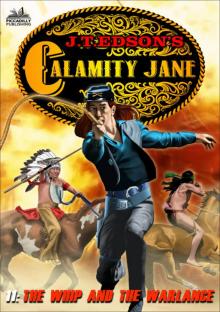 Calamity Jane 11
Calamity Jane 11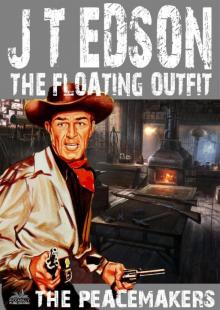 The Floating Outift 33
The Floating Outift 33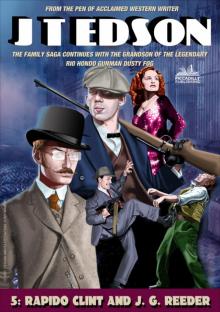 Cap Fog 5
Cap Fog 5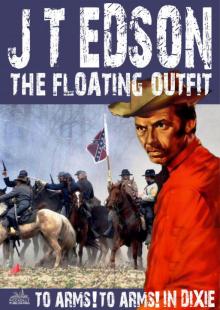 The Floating Outfit 34
The Floating Outfit 34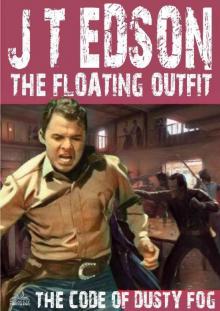 The Code of Dusty Fog
The Code of Dusty Fog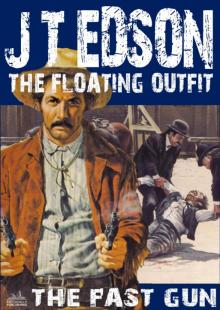 The Floating Outfit 21
The Floating Outfit 21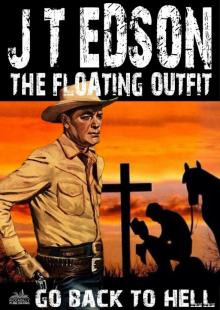 The Floating Outift 36
The Floating Outift 36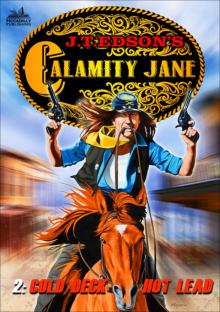 Calamity Jane 2
Calamity Jane 2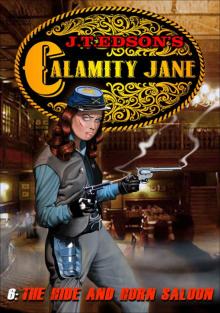 Calamity Jane 6: The Hide and Horn Saloon (A Calamity Jane Western)
Calamity Jane 6: The Hide and Horn Saloon (A Calamity Jane Western)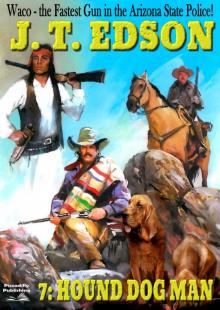 Waco 7
Waco 7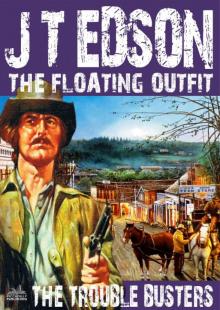 The Floating Outfit 25
The Floating Outfit 25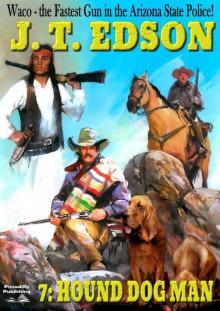 Waco 7: Hound Dog Man (A Waco Western)
Waco 7: Hound Dog Man (A Waco Western)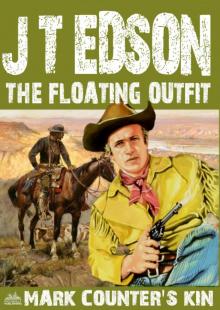 The Floating Outfit 47
The Floating Outfit 47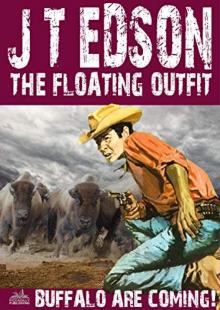 The Floating Outfit 42: Buffalo Are Coming!
The Floating Outfit 42: Buffalo Are Coming!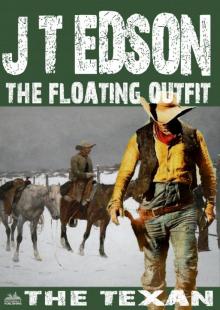 The Floating Outfit 46
The Floating Outfit 46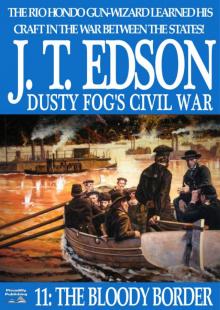 Dusty Fog's Civil War 11
Dusty Fog's Civil War 11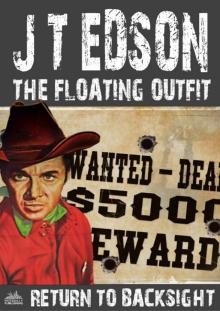 The Floating Outfit 61
The Floating Outfit 61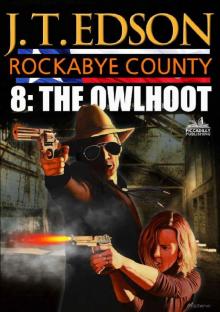 The Owlhoot
The Owlhoot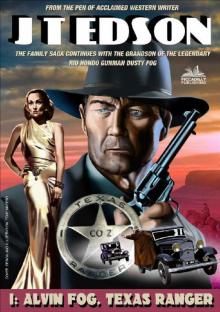 Alvin Fog, Texas Ranger
Alvin Fog, Texas Ranger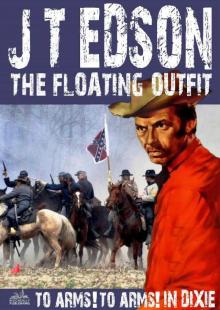 The Floating Outfit 34: To Arms! To Arms! In Dixie! (A Floating Outfit Western)
The Floating Outfit 34: To Arms! To Arms! In Dixie! (A Floating Outfit Western)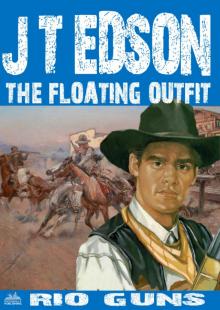 The Floating Outfit 44
The Floating Outfit 44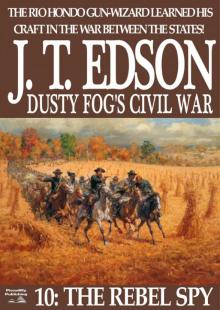 Dusty Fog's Civil War 10
Dusty Fog's Civil War 10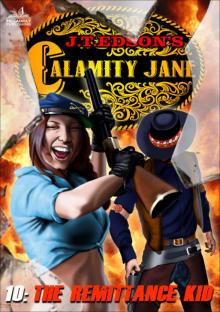 Calamity Jane 10
Calamity Jane 10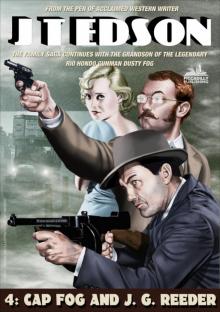 Cap Fog 4
Cap Fog 4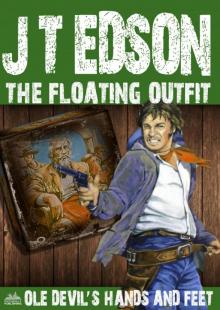 The Floating Outfit 51
The Floating Outfit 51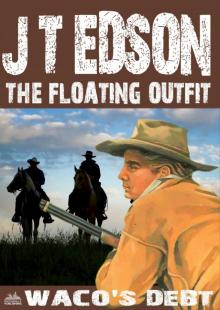 The Floating Outfit 50
The Floating Outfit 50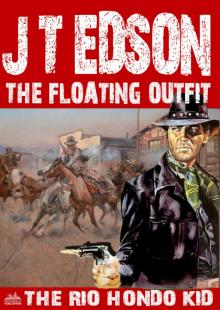 The Floating Outfit 49
The Floating Outfit 49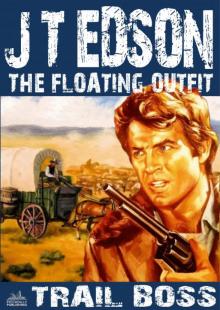 The Floating Outfit 10
The Floating Outfit 10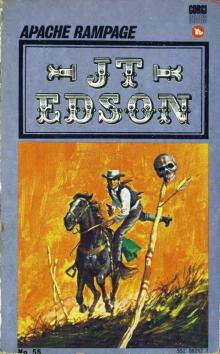 Apache Rampage
Apache Rampage The Floating Outfit 15
The Floating Outfit 15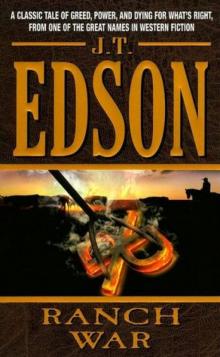 Ranch War
Ranch War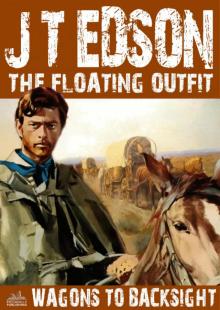 The Floating Outfit 11
The Floating Outfit 11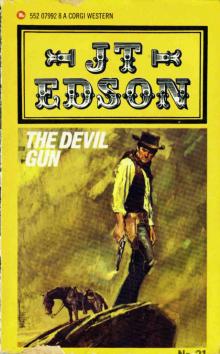 The Devil Gun
The Devil Gun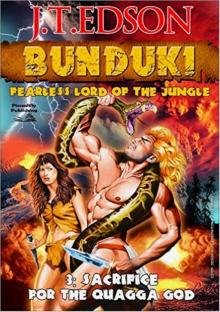 Sacrifice for the Quagga God (A Bunduki Jungle Adventure Book 3)
Sacrifice for the Quagga God (A Bunduki Jungle Adventure Book 3)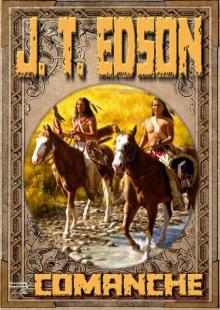 Comanche (A J.T. Edson Western Book 1)
Comanche (A J.T. Edson Western Book 1)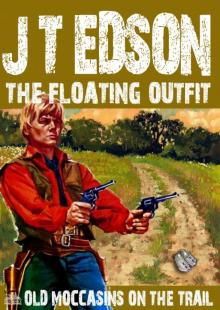 The Floating Outfit 48
The Floating Outfit 48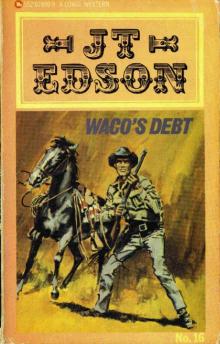 Wacos Debt
Wacos Debt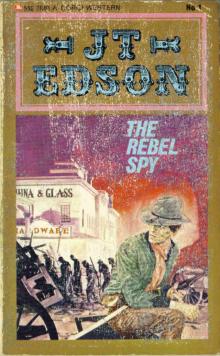 The Rebel Spy
The Rebel Spy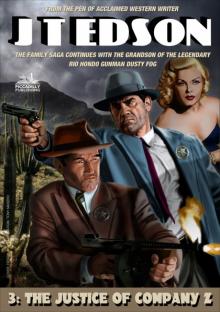 Cap Fog 3
Cap Fog 3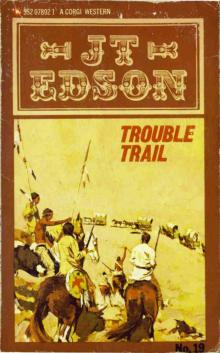 Trouble Trail
Trouble Trail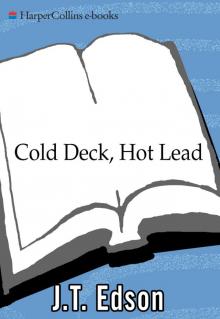 Cold Deck, Hot Lead
Cold Deck, Hot Lead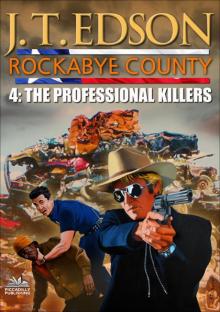 Rockabye County 4
Rockabye County 4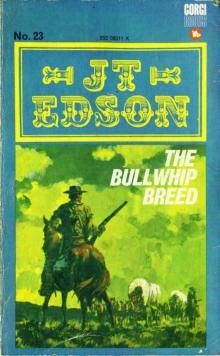 The Bullwhip Breed
The Bullwhip Breed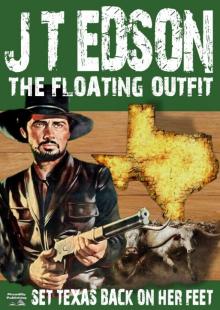 Set Texas Back On Her Feet (A Floating Outfit Western Book 6)
Set Texas Back On Her Feet (A Floating Outfit Western Book 6)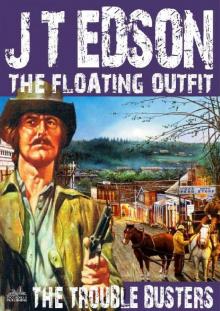 The Floating Outfit 25: The Trouble Busters (A Floating Outfit Western)
The Floating Outfit 25: The Trouble Busters (A Floating Outfit Western)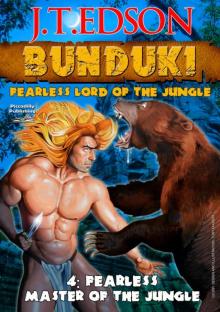 Fearless Master of the Jungle (A Bunduki Jungle Adventure
Fearless Master of the Jungle (A Bunduki Jungle Adventure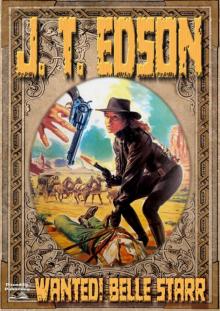 Wanted! Belle Starr!
Wanted! Belle Starr!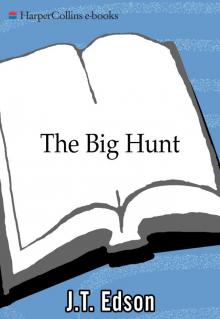 The Big Hunt
The Big Hunt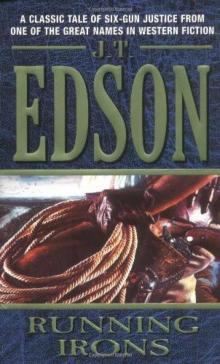 Running Irons
Running Irons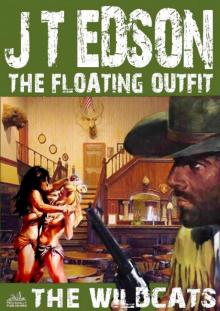 The Floating Outfit 19
The Floating Outfit 19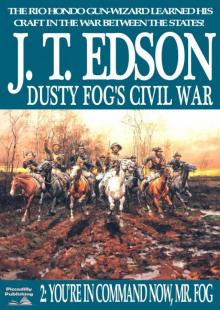 You're in Command Now, Mr Fog
You're in Command Now, Mr Fog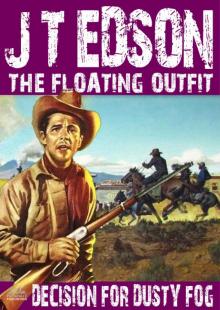 The Floating Outfit 27
The Floating Outfit 27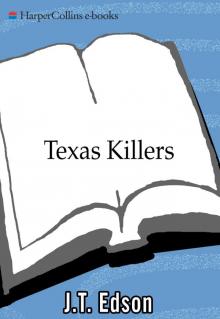 Texas Killers
Texas Killers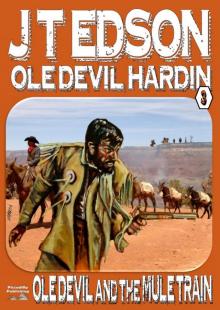 Ole Devil and the Mule Train (An Ole Devil Western Book 3)
Ole Devil and the Mule Train (An Ole Devil Western Book 3)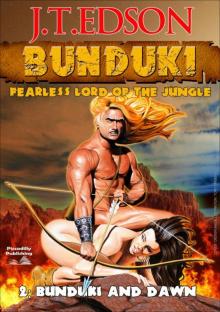 Bunduki and Dawn (A Bunduki Jungle Adventure Book 2)
Bunduki and Dawn (A Bunduki Jungle Adventure Book 2)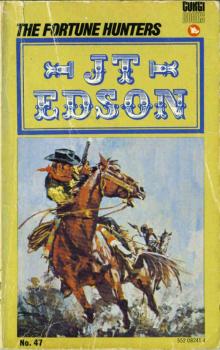 The Fortune Hunters
The Fortune Hunters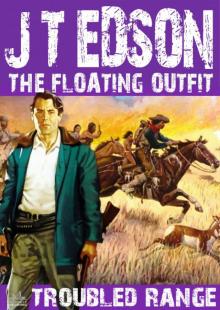 The Floating Outfit 12
The Floating Outfit 12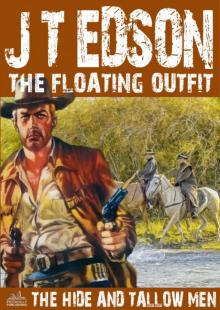 The Hide and Tallow Men (A Floating Outfit Western. Book 7)
The Hide and Tallow Men (A Floating Outfit Western. Book 7)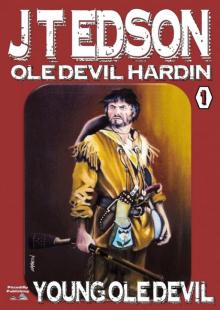 Young Ole Devil
Young Ole Devil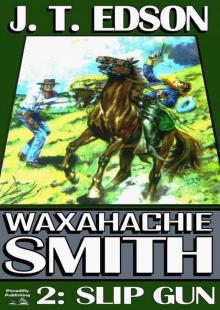 Slip Gun
Slip Gun The Drifter
The Drifter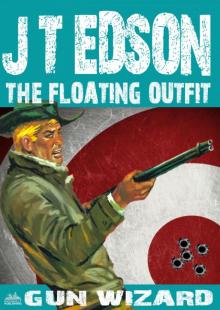 The Floating Outfit 45
The Floating Outfit 45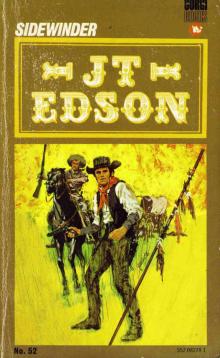 Sidewinder
Sidewinder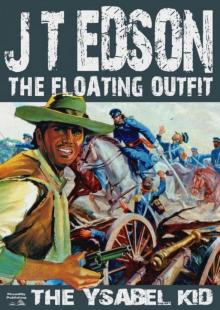 The Ysabel Kid
The Ysabel Kid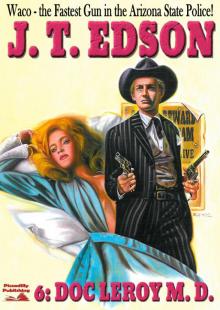 Waco 6
Waco 6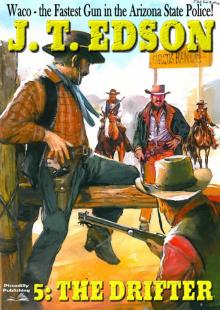 Waco 5
Waco 5 Point of Contact
Point of Contact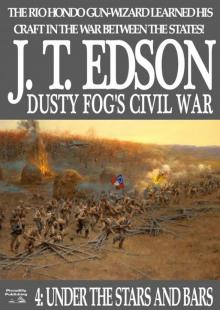 Under the Stars and Bars (A Dusty Fog Civil War Western Book 4)
Under the Stars and Bars (A Dusty Fog Civil War Western Book 4)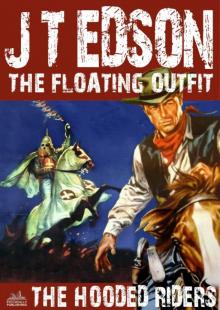 The Floating Outfit 9
The Floating Outfit 9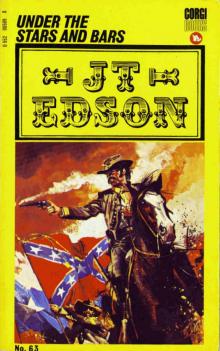 Under the Stars and Bars
Under the Stars and Bars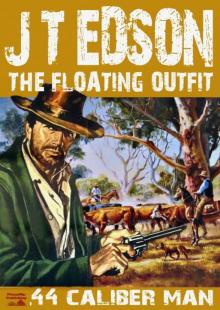 .44 Caliber Man
.44 Caliber Man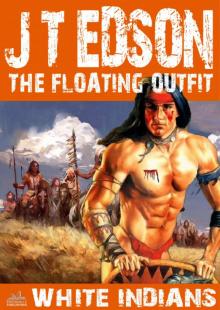 The Floating Outfit 17
The Floating Outfit 17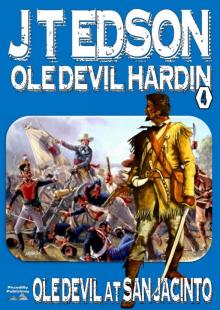 Ole Devil at San Jacinto (Old Devil Hardin Western Book 4)
Ole Devil at San Jacinto (Old Devil Hardin Western Book 4)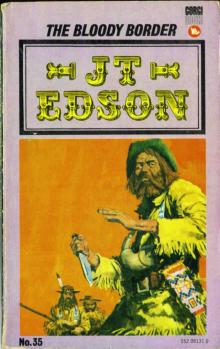 The Bloody Border
The Bloody Border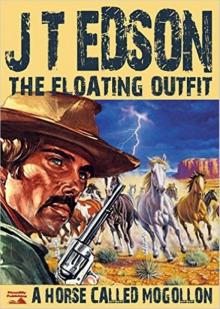 A Horse Called Mogollon (Floating Outfit Book 3)
A Horse Called Mogollon (Floating Outfit Book 3)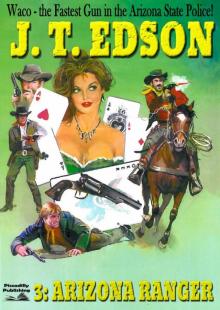 Waco 3
Waco 3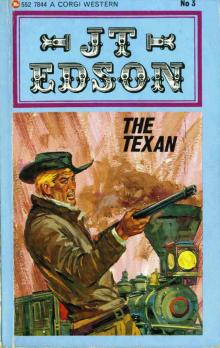 The Texan
The Texan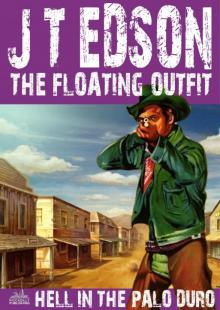 The Floating Outfit 35
The Floating Outfit 35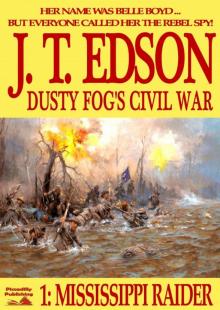 Mississippi Raider
Mississippi Raider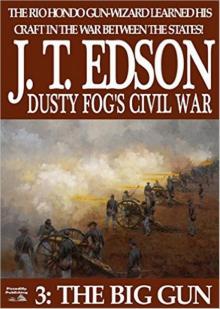 The Big Gun (Dusty Fog's Civil War Book 3)
The Big Gun (Dusty Fog's Civil War Book 3)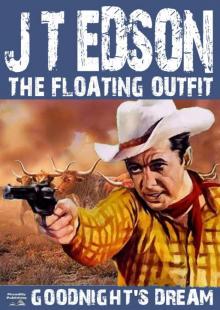 Goodnight's Dream (A Floating Outfit Western Book 4)
Goodnight's Dream (A Floating Outfit Western Book 4) Waco 4
Waco 4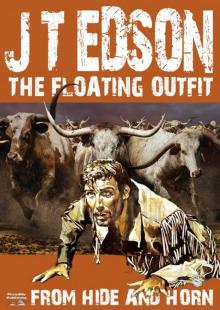 From Hide and Horn (A Floating Outfit Book Number 5)
From Hide and Horn (A Floating Outfit Book Number 5)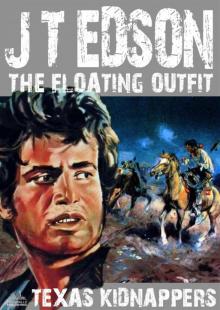 The Floating Outfit 18
The Floating Outfit 18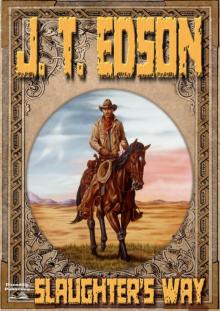 Slaughter's Way (A J.T. Edson Western)
Slaughter's Way (A J.T. Edson Western)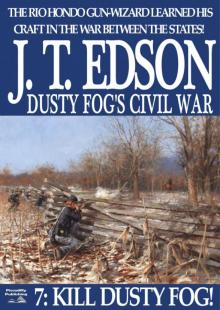 Dusty Fog's Civil War 7
Dusty Fog's Civil War 7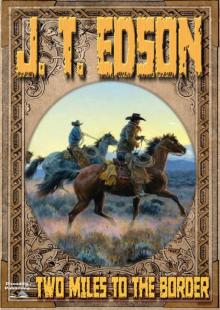 Two Miles to the Border (A J.T. Edson Western)
Two Miles to the Border (A J.T. Edson Western)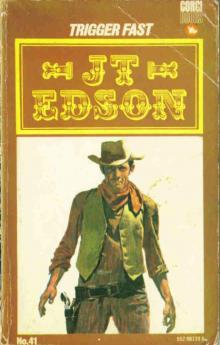 Trigger Fast
Trigger Fast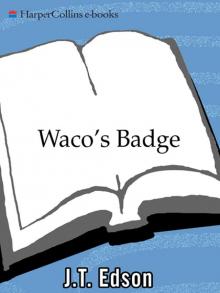 Waco's Badge
Waco's Badge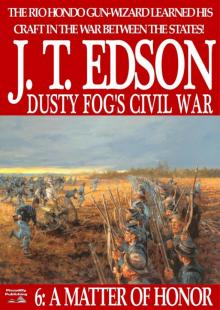 A Matter of Honor (Dusty Fog Civil War Book 6)
A Matter of Honor (Dusty Fog Civil War Book 6)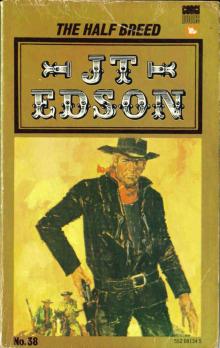 The Half Breed
The Half Breed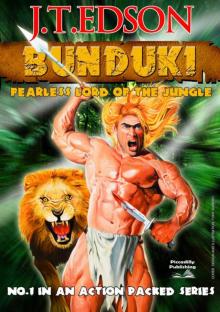 Bunduki (Bunduki Series Book One)
Bunduki (Bunduki Series Book One)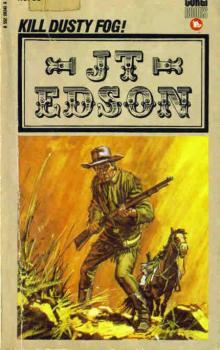 Kill Dusty Fog
Kill Dusty Fog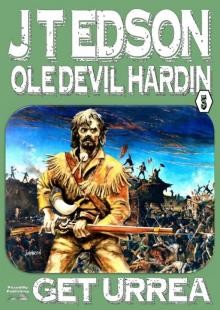 Get Urrea! (An Ole Devil Hardin Western Book 5)
Get Urrea! (An Ole Devil Hardin Western Book 5)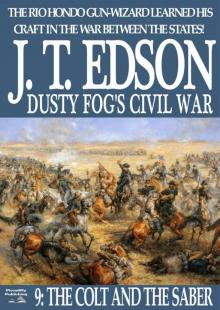 Dusty Fog's Civil War 9
Dusty Fog's Civil War 9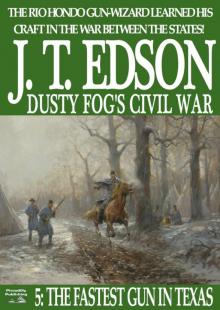 The Fastest Gun in Texas (A Dusty Fog Civil War Book 5)
The Fastest Gun in Texas (A Dusty Fog Civil War Book 5)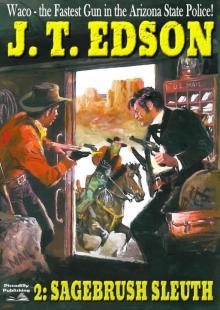 Sagebrush Sleuth (A Waco Western #2)
Sagebrush Sleuth (A Waco Western #2)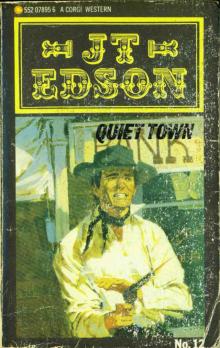 Quiet Town
Quiet Town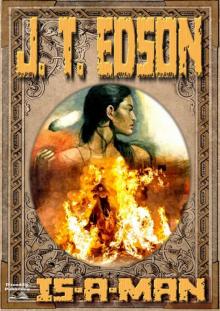 Is-A-Man (A J.T. Edson Standalone Western)
Is-A-Man (A J.T. Edson Standalone Western)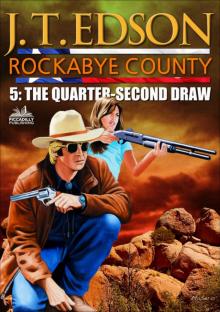 Rockabye County 5
Rockabye County 5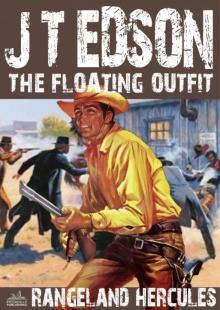 The Floating Outfit 14
The Floating Outfit 14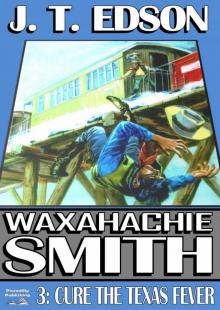 Cure the Texas Fever (A Waxahachie Smith Western--Book 3)
Cure the Texas Fever (A Waxahachie Smith Western--Book 3)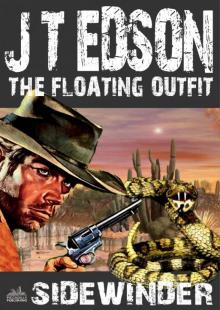 The Floating Outfit 13
The Floating Outfit 13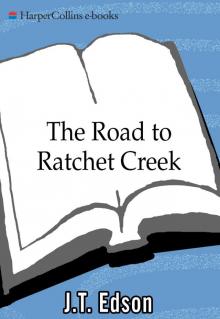 The Road to Ratchet Creek
The Road to Ratchet Creek